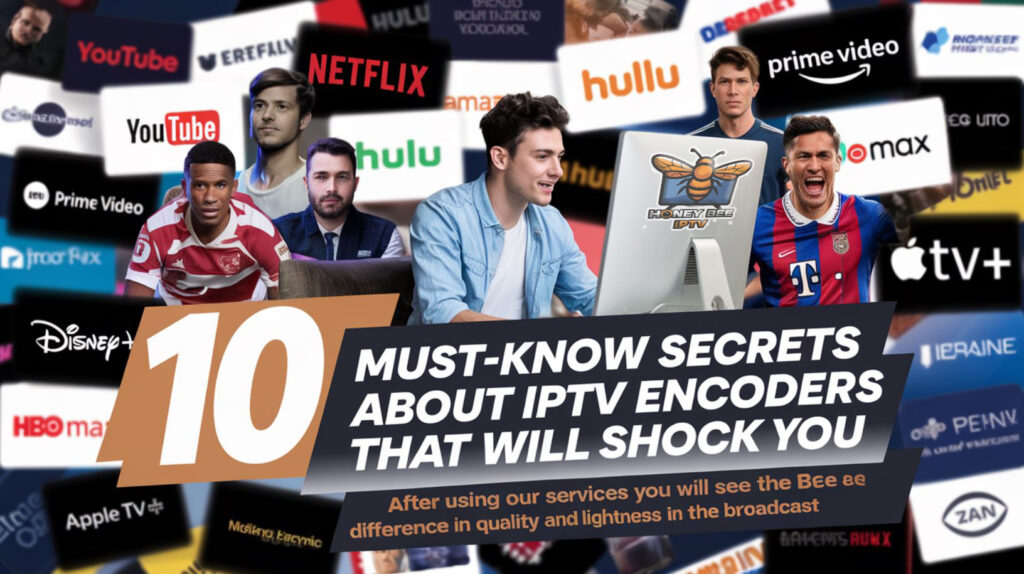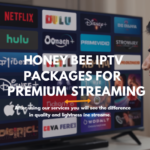Understanding IPTV Encoding
What is an IPTV Encoder?
An IPTV encoder is a device or software solution that converts video content into a digital format suitable for streaming over the internet. It compresses raw video signals into efficient streams, ensuring smooth transmission to end users. Encoding plays a vital role in ensuring that the content is accessible across different devices, including smart TVs, smartphones, tablets, and computers.
Why IPTV Encoding Matters in Streaming
IPTV encoding is essential for reducing bandwidth consumption, improving video quality, and enabling seamless content delivery across multiple devices. Without efficient encoding, streaming services would struggle with buffering, poor resolution, and increased costs. Additionally, high-quality encoding ensures that viewers receive content in the best possible resolution without unnecessary delays.

Types of IPTV Encoders
Hardware Encoders vs. Software Encoders
- Hardware Encoders: Dedicated devices built for high-performance encoding, offering low latency and superior video quality. These are widely used by professional broadcasters and large-scale streaming services for their efficiency and stability.
- Software Encoders: Applications running on computers, providing flexibility and cost-effectiveness but requiring high processing power. Popular software encoders include OBS Studio, Wirecast, and vMix, which allow users to configure encoding settings as per their streaming needs.
Choosing the Right IPTV Encoder for Your Needs
Consider factors such as budget, video resolution requirements, compatibility with streaming protocols, and scalability before selecting an IPTV encoder. If you require low latency and high-quality streams, investing in a hardware encoder is recommended. On the other hand, software encoders are great for small-scale streaming solutions and those who need flexibility in their streaming setup.

Exploring Vecaster 4K IPTV Encoder
Features of Vecaster 4K IPTV Encoder
Vecaster 4K IPTV encoder offers ultra-high-definition encoding, low-latency transmission, and support for multiple streaming protocols, making it an ideal choice for professional IPTV streaming. It is specifically designed for businesses that require consistent video quality and high reliability in content delivery.
Benefits of Using Vecaster 4K for IPTV Streaming
- High-efficiency video compression
- Reliable performance with minimal buffering
- Support for various resolutions and frame rates
- Seamless integration with IPTV platforms
- Support for adaptive bitrate streaming, ensuring users with varying internet speeds can access the content without interruptions
- Easy setup and configuration for both beginners and advanced users
How IPTV Encoders Work
Video Compression and Transmission Explained
IPTV encoders use advanced compression techniques (H.264, H.265) to reduce file sizes while maintaining video quality. The encoded content is then transmitted over IP networks to IPTV service providers or end-users. Compression ensures that large video files are converted into manageable formats, allowing for smooth streaming even in areas with limited internet bandwidth.

Role of Codecs in IPTV Encoding
Codecs like H.264 and HEVC (H.265) determine how efficiently video data is compressed and transmitted. The choice of codec impacts streaming quality, bandwidth usage, and device compatibility. While H.264 remains the industry standard due to its balance between quality and compression, H.265 is gaining popularity due to its superior efficiency in handling 4K and 8K content.
Key Features to Look for in an IPTV Encoder
Video Quality and Resolution
Higher resolutions, such as 4K and 8K, demand advanced encoding capabilities to ensure smooth playback without excessive bandwidth consumption. A high-quality encoder should be able to handle multiple resolutions while maintaining minimal lag and latency.
Bitrate Control and Latency Management
Adjustable bitrate settings help balance quality and performance, while low-latency encoding ensures real-time streaming without delays. This is crucial for live broadcasts, where any delay can negatively impact user experience.
Protocol Support (HLS, RTMP, etc.)
A good IPTV encoder supports multiple protocols, enabling compatibility with various streaming platforms and content distribution networks. Popular protocols include:
- RTMP (Real-Time Messaging Protocol): Ideal for live streaming with low latency
- HLS (HTTP Live Streaming): Provides high compatibility across different devices
- MPEG-DASH: Used for adaptive bitrate streaming, optimizing playback quality
Honey Bee IPTV: A Reliable IPTV Service
Honey Bee IPTV Review
Honey Bee IPTV offers a vast library of channels, reliable streaming, and high-quality content delivery, making it a top choice among IPTV users. It provides users with a seamless experience, ensuring uninterrupted access to live TV, sports, and on-demand content.
Features and Performance of Honey Bee IPTV
- Wide range of live TV channels
- High-definition streaming with minimal buffering
- User-friendly interface and responsive customer support
- Multi-device support, allowing access on smart TVs, mobile devices, and tablets
- Affordable subscription plans tailored to different user needs

Click HERE to Get Honey Bee IPTV Free Trial NOW
Why Choose Honey Bee IPTV?
Honey Bee IPTV stands out due to its affordability, content variety, and seamless streaming experience. It also offers a wide range of international channels, making it an excellent choice for users looking for diverse content options.
Visit Honey Bee IPTV Official Website
Step-by-Step Guide to Setting Up an IPTV Encoder
Choosing the Right Hardware
Select an encoder that matches your streaming needs, considering factors like resolution, scalability, and hardware capabilities.
Configuring Encoder Settings
Adjust bitrate, codec, and resolution settings to optimize streaming quality based on available bandwidth. Testing different settings is crucial to finding the perfect balance between video quality and network stability.
Connecting to a Streaming Platform
Ensure your encoder is properly linked to your IPTV service or content distribution network for smooth content delivery. Platforms like YouTube Live, Facebook Live, and Twitch require different encoding configurations, so ensure your setup meets the platform’s requirements.
Future of IPTV Encoding Technology
Advances in AI-Powered Encoding
Artificial intelligence is improving video compression efficiency, reducing latency, and enhancing streaming quality. AI-powered encoders can dynamically adjust bitrate and resolution based on real-time network conditions.
The Rise of 8K and Beyond
As 8K content becomes more prevalent, IPTV encoders will need to evolve to handle higher resolutions and advanced streaming requirements. Future encoders will offer enhanced AI-driven optimizations, enabling smoother streaming experiences even at ultra-high resolutions.
Conclusion
IPTV encoding is an essential component of modern streaming services, ensuring that content is delivered efficiently and in high quality. Whether you’re a content creator, a business owner, or an IPTV service provider, investing in the right encoder can significantly improve your streaming experience. By choosing the right hardware, optimizing settings, and staying updated on the latest encoding technologies, you can ensure a seamless and professional IPTV streaming service.
FAQs
- What is the best IPTV encoder for 4K streaming? Vecaster 4K IPTV encoder is a top choice for high-quality 4K streaming due to its reliability and low latency.
- Can I use a software encoder instead of a hardware one? Yes, but software encoders require significant processing power and may introduce latency compared to hardware solutions.
- What is the best codec for IPTV streaming? H.265 (HEVC) is currently the most efficient codec, especially for high-resolution content.
- Does IPTV encoding affect video quality? Yes, better encoding techniques improve video quality while reducing bandwidth consumption.
- How do I reduce latency in IPTV streaming? Use a hardware encoder with low-latency protocols like RTMP and optimize bitrate settings.
- Is IPTV encoding legal? Yes, as long as you have the proper rights to distribute the content.
- What’s the difference between HLS and RTMP? HLS is better for adaptive streaming, while RTMP offers lower latency.
- Do I need a separate encoder for live and on-demand content? No, most IPTV encoders support both live and on-demand content.
- What internet speed is required for 4K IPTV streaming? At least 25 Mbps is recommended for smooth 4K streaming.
- How do I set up an IPTV encoder? Connect your source, configure settings, and link to your streaming platform.





